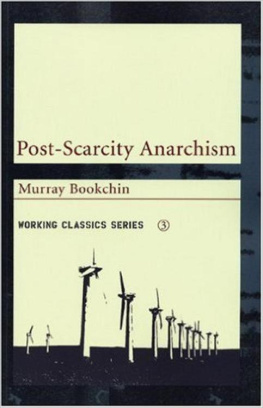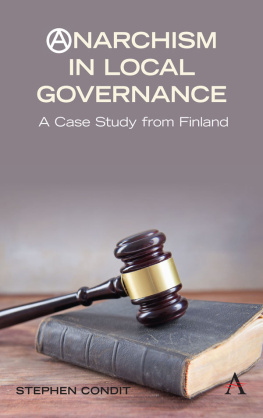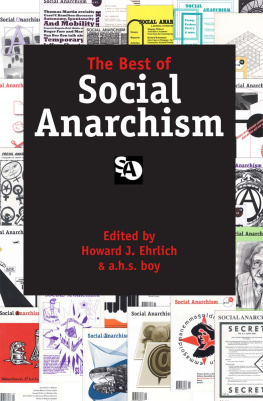Murray Bookchin - Whither Anarchism?: A Reply to Recent Anarchist Critics
Here you can read online Murray Bookchin - Whither Anarchism?: A Reply to Recent Anarchist Critics full text of the book (entire story) in english for free. Download pdf and epub, get meaning, cover and reviews about this ebook. year: 1998, genre: Politics. Description of the work, (preface) as well as reviews are available. Best literature library LitArk.com created for fans of good reading and offers a wide selection of genres:
Romance novel
Science fiction
Adventure
Detective
Science
History
Home and family
Prose
Art
Politics
Computer
Non-fiction
Religion
Business
Children
Humor
Choose a favorite category and find really read worthwhile books. Enjoy immersion in the world of imagination, feel the emotions of the characters or learn something new for yourself, make an fascinating discovery.
- Book:Whither Anarchism?: A Reply to Recent Anarchist Critics
- Author:
- Genre:
- Year:1998
- Rating:5 / 5
- Favourites:Add to favourites
- Your mark:
- 100
- 1
- 2
- 3
- 4
- 5
Whither Anarchism?: A Reply to Recent Anarchist Critics: summary, description and annotation
We offer to read an annotation, description, summary or preface (depends on what the author of the book "Whither Anarchism?: A Reply to Recent Anarchist Critics" wrote himself). If you haven't found the necessary information about the book — write in the comments, we will try to find it.
Whither Anarchism?: A Reply to Recent Anarchist Critics — read online for free the complete book (whole text) full work
Below is the text of the book, divided by pages. System saving the place of the last page read, allows you to conveniently read the book "Whither Anarchism?: A Reply to Recent Anarchist Critics" online for free, without having to search again every time where you left off. Put a bookmark, and you can go to the page where you finished reading at any time.
Font size:
Interval:
Bookmark:
Murray Bookchin

All Your Books Are Belong To Us !
http://c3jemx2ube5v5zpg.onion
A Reply to Recent Anarchist Critics
Copyright 1998 Murray Bookchin
Murray Bookchin in his article "Whither Anarchism? A Reply to Recent Anarchist Critics" gives an account of how John Clark and Dimitri Roussopoulos were "dropped" from the International Advisory Board of Democracy and Nature (formerly Society and Nature), which is completely inaccurate. Although, as Bookchin points out, it is true that the journal never claimed to be a social ecology journal, still the fact that we published more articles from social ecologists than from any other political current created the impression to some, including Andrew Light in the CNS interview that Bookchin refers to, that the journal is an organ of social ecology. However, as far as the journal is concerned, it has clearly declared since its very first issue, back in 1992, and repeated since then, that its aim was "to initiate an urgently needed dialogue on the crucial question of developing a new liberatory social project, at a moment in History when the Left has abandoned this traditional role; the materialisation of the liberatory project and the transition from a hierarchical society to an ecological one is meant as the outcome of a dialectical synthesis of three tendencies that are expressed in corresponding political traditions and movements: the autonomous- democratic tradition (that includes the feminist movement), the libertarian socialist and the radical green movements". Obviously, for us in the journal, social ecology and libertarian municipalism have always been just a component -albeit an important one- of this synthesis. In fact, Murray himself has misconceived the nature of the journal and its aims and this has led him to dissociate from the journal and resign from its advisory board as soon as he became conscious of this misconception (see reply of the editorial board to Murray Bookchin's resignation letter, Democracy & Nature no 9 (1997).
Socialism without liberty is slavery and brutality.
Mikhail Bakunin
Font size:
Interval:
Bookmark:
Similar books «Whither Anarchism?: A Reply to Recent Anarchist Critics»
Look at similar books to Whither Anarchism?: A Reply to Recent Anarchist Critics. We have selected literature similar in name and meaning in the hope of providing readers with more options to find new, interesting, not yet read works.
Discussion, reviews of the book Whither Anarchism?: A Reply to Recent Anarchist Critics and just readers' own opinions. Leave your comments, write what you think about the work, its meaning or the main characters. Specify what exactly you liked and what you didn't like, and why you think so.








